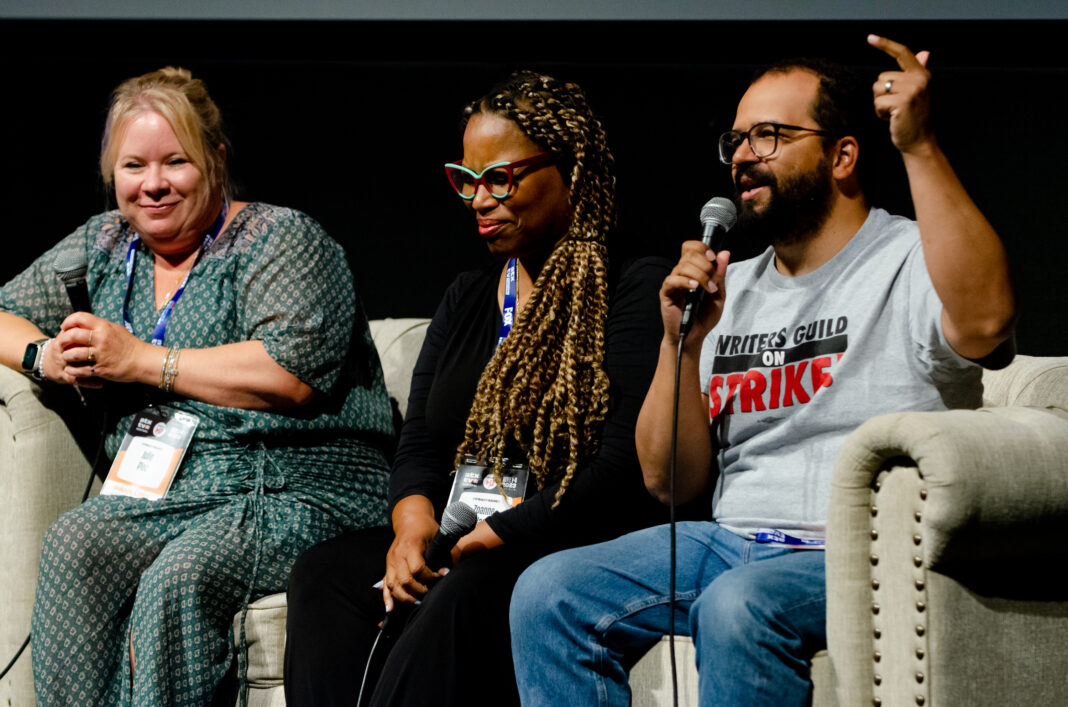For the first time in 15 years, the writers of the Writers Guild of America (WGA) have put their pencils down as career-dependent issues on fair pay, streaming residuals, artificial intelligence, and the size of writers rooms are once again front-and-center, putting Hollywood on “pause” in the ongoing writer’s strike.
One of the biggest highlights and value-adds from this year’s twelfth season of ATX TV Festival in Austin, Texas, was the WGA On Strike! panel, which dove head first into the ongoing WGA strike and the main issues surrounding the walkout at the ATX TV Festival that had a good chunk of programming removed from this year’s four-day event.
The panel, which was moderated by Beau Willimon, the former president of WGA East and the playwright/showrunner who launched Netflix’s “House of Cards,” featured a humble group of high-profile writers, including:
- Zoanna Clack, MD, a member of WGA West and an executive producer on medical drama Grey’s Anatomy, as well as serving as an executive producer and head writer of the new spinoff Station 19;
- Julie Plec, a member of WGA West and the co-creator and executive producer of The Vampire Diaries; and
- Greg Iwinski, a member of WGA East’s Negotiating Committee, as well as a former writer on “Last Week Tonight With John Oliver” and “The Late Show With Stephen Colbert.”
What’s At Stake, Where Are We Right Now?
Kicking off with Iwinski, Willimon asked the former late night tv writer to breakdown what’s at the heart of the ongoing writer’s strike and where things are at right now.
Iwinski, who serves on WGA East’s Negotiating Committee, sits on a 17-member team of writers from both WGA East and WGA West that help influence all kinds of writing that spans across film, episodic television, late night television, soap operas, and game shows.
The Negotiating Committee is primarily responsible for building out a plan for what its negotiations are every three years, and then going in to try and negotiate that plan.
The most recent plan, according to Iwinski, which started several months ago, led to six weeks of negotiation with the Association of Motion Picture Television Producers in a mall in Sherman Oaks, California, where the Committee sat down face-to-face with the executives on the specific issues writers are currently facing.
“Essentially, our argument was that the streaming model of television, which was so appealing lots of years ago, no longer works and was consequently leading to the creation of an unsustainable system that was eliminating the creation of new and experienced showrunners while destroying writer pay,” Iwinski explained.
He continued by explaining how the negotiations were structured, praising the WGA’s structure as entirely member-based:
“We did not do a focus group, we did not go in and ask a management company what we should be asking for – we asked our 11,000 members, and got back 7,000 surveys,” he emphasized.
At the center of WGA members’ concerns was the complete annihilation of writer pay, including screenwriters who had been asked to do rewrite after rewrite of free work, when they weren’t being paid for that rewrite.
“We brought these arguments to the studios and presented our solutions, and I had gone in with the expectation that it would be a very difficult negotiation, and we would get a situation where we’d be presented with a deal that was not a great deal, but hard to say ‘no’ to – and that is not what happened,” Iwinski stated.
After six weeks of negotiation, Iwinski said that in the final days of negotiations, “they were still incredibly far apart,” he stated, revealing that the night that the strike was called, they had put out where they were:
“…half of the things we had talked about, they did not respond to, and for many of the things, like the screenwriter problem, they said they were willing to meet with us to explain why we were incorrect…they offered a meeting with screenwriters to explain how free work doesn’t happen.
Instead of bringing writers onto set, they offered to create a free, unpaid internship in which you could bring a writer onto set after they had been writing – now they’re there for free – and they can shadow you as a showrunner to learn the craft of showrunning. These were their last and best offers, so that’s why we’re on strike.”
In response, Willimon asked Iwinski to illustrate the amount of money that is at stake here:
“We’re talking about in total $400 million to $450 million across all four companies to solve this. The delays, shutdowns, and damages of the strike have already cost around $1 billion. We’re already way past what it would have cost to give us the deal. In perspective, there are companies for whom their share is $10 million to $17 million, which their executive makes in a month,” he told Willimon.
Willimon said that if WGA was getting everything it asked for, they’d be looking at less than 2% of their profits (after spending) –
“…and again, writers always start with something blank that eventually turns into a successful show like The Office or The Minions that gets quoted for the rest of time across pop culture and memes. All of these ideas came from a writer’s brain, and that is worth at least 2% and I would argue much more than that,” Iwinski prefaced.
The Necessity of Writers Rooms
At the center of these negotiations are the writers rooms, which Clack provided a very humble, impactful perspective on why their continued existence is crucial.
“I’ve given you hundreds of episodes of Grey’s Anatomy, and part of that reason is because I’m super afraid to leave,” she said half-jokingly.
“People don’t believe that it’s as worthy or prize-winning, which it isn’t, but we don’t do the award-thing – we do the stability thing. The fact that you can go out and I can have my 22 episodes of network tv and go out to streaming and maybe get a six episode order, and then not get a job again for the next two years – frightens me to the core of my soul.”
She said that while she’s known a lot of people who worked for two years on a six or eight episode season and received the awards and accolades, the reality is that they’ve only made $80,000 to $100,000 over the course of the two years doing a lot of free work – a lot of free production and free editing.
“Their rooms go away. The writers literally go away. The showrunner and maybe one other person are responsible for doing all the production, filming, and being on set. So, all of these writers have been paid their minimal fees for the amount of weeks they are bargained for, and then they’re gone. They don’t learn the business or see the fruits of their labor. Any rewrites have to be the showrunner or the other person they’ve kept,” Clack explained.
Clack says that now, it’s “expected” that people just come in and write their episodes with the creators, which she says is why this needs to be fought for – specifically, fighting for the minimal number of people in the rooms:
“…because if we don’t have enough people investing into our healthcare system or pension plans, that’s going to go away. We need to have people working to buy into that so we can keep that flush for our future, and the other reason is to have people learn and see the fruits of their labor – and not to just be the ‘one-off’ or gig workers. Most of us went into this for a career, so in order to be sustainable and to have a career and be able to move up the ladder, you have to be in a writer’s room, have to be on set, have to learn to edit, have to learn all of it in order to get to the next stage and be a showrunner that can do the job.”
Historically, network television would produce a single season that would effectively last throughout the year, but unfortunately, there are many shows now that have “mini-rooms,” that is a quick in-and-out model to the detriment of writers.
Iwinski illustrated what a “mini-room” actually looks like:
“Why don’t I put six people in a room for six weeks, and they’ll come up with a little thing called – all the characters, all the storylines, the whole idea of what the show is and where it happens. And once I have that, I can just go and freelance scripts out.”
And according to Clack, these mini-rooms do not afford any sense of comradery nor stability.
“With mini-rooms, it’s as if these executives want to not to do their jobs to the effect of ‘I don’t know, we think this show may be good. Why don’t you guys write it and figure it out, and then we’ll see if we will green light it,’” she added.
Zoanna Clak, M.D.
In the past, Clack says executives stood by what they thought was good, pushed for it, and became advocates for it – and if it didn’t work, it didn’t work.
The Age of Streaming
The ongoing strike represents the seventh time in the last 90 years, making this the most militant of all the entertainment unions and guilds.
To put things in perspective, there was a six month strike in 1960 to get basic things like healthcare, pension, and residuals, with the last major strike we encountered occurring in 2007, which centered around having jurisdiction over “new media” – specifically, streaming.
Plec, who was already a showrunner during that point, distinguished the 2007 strike from the one we are currently in across three major categories:
#1 – Nervous About What Was Ahead – And Now We’re Mad
Plec confessed that she even has friends that have worked in the industry for 15 years straight that no longer have jobs right now, who are taking the jobs at 30 to 60% less pay.
“We were nervous about what was ahead. We were concerned with what we saw coming down the pipeline, but there was an intangibility with that concern. It turned out to be quite precinct and ultimately, catastrophically accurate.
You were taking to the lines to fight for something down the line you really thought would be important, but there was a nebulous, ephemeral quality about it.
Now, we’re mad, we’re just mad.”
“The sort of lack of care for artists and content creators of this business has reached a breaking point – not just in the writer’s guild, but in all labor guilds,” she stated.
“We are able to have this community of raw anger that is fueling the solidarity on the picket lines, because there is a clear enemy in this. And it’s not us.”
#2 – The Last Gasp of Millennials, The First Gasp of Gen-Z
“This is a community of folks who have seen the shit hit them, again and again. It started with perhaps, 9/11 and the fallout of that and war, then the housing collapse and financial collapse, and then 2016 where people took to the streets in protest, and then 2020 and people taking to the streets and protesting, and then COVID-19 and taking to the streets and protesting. Everything in this new generation is about taking the fight to the streets, and that’s a really good thing for us as striking workers right now – there is an energy and enthusiasm about activism.”
And it’s this enthusiasm that Plec says is a “very important key” to all of this, noting that “striking isn’t fun.”
“…to have that raw energy of true union power isn’t something you get every cycle in this guild,” she emphasized.
#3 – Changing Sentiment of Compassion
What isn’t so great is the change of the historical sentiment that the town was still run by people who cared about artists – not always those who were at the top of the corporate food chain.
“They had to really, true believe in making these stories and art. While they had to manage a bottom line and understood that hard decisions did have to be made, they did also truly believe in the spirit of art and creating art, and there was money to be made by all in success. And I think that’s all but gone, and that’s not good for people who are supporting this union and are members of this union. When you put it into the perspective of the people that need to make the compassionate decision to compassionately reward artists for a job well done, there is no room for compassion at the level of corporate. And I think it will make this battle all the more difficult. We have to be in this for the long haul, because there isn’t a room full of benevolence holding out to be the least amount of benevolent they can be,” Plek explained.
Adding to her point, Iwinski said that during negotiations, they were negotiating to a “room full of labor lawyers and business affairs” – not the studio heads and executives:
“There’s no mythical writers world where every exec goes ‘I love art so much, go and do your dream’ – no, this is a business. But, it’s cool if a person running a hamburger stand thinks hamburgers taste good…and likes them. And there is no evidence that this is true.”
Turning to his go-to NBA analogies, Iwinski put the entire writers room debate on center court –
“What if instead of the whole NBA team, we instead just had two all-stars and they did the whole game?
And you go, ‘well, you need 11 other people, so they don’t die.’
And they go ‘but do we? What if we just had LeBron and Anthony Davis and they’re both good, and they’ll just have the ball and can pass to each other?’
And everyone else is going, ‘what is happening?’
And that’s what’s happening with staff size – what if these two all-star writers write all the episodes? And here’s the thing, if you’re a really important white dude, you can go yeah, whatever or no, I want six writers. But, if you’re a lower level or mid-level writer or a woman, or person of color, or a woman of color – and you say ‘actually, they need six writers,’ they’ll just say no, because the white guy didn’t need them, so you don’t need them. That is why we’re fighting to the death for room size.”
The Gloom and Doom of AI
Turning to the surging popularity of artificial intelligence (AI), Iwinski shared his beliefs of executives being “extremely susceptible to vaporware.”
“There is some element of AI, where people will be promising the moon and delivering the mountain – but it doesn’t matter, and that’s the real issue you’re seeing here with the studios is “what if it doesn’t matter that it’s good?”
For people who don’t believe in quality, including executives, does it really matter that an AI movie sucks? And that the AI directing bot is doing really bad shots and the AI actors are glitching out? Does it matter if it keeps people from canceling a subscription?
“So, the threat of us being replaced is not that they are ever going to match our quality, it’s that our bosses don’t care.”
You can watch the full panel below:








